Walther 4-12x50 CI Handleiding
Walther
Niet gecategoriseerd
4-12x50 CI
Bekijk gratis de handleiding van Walther 4-12x50 CI (4 pagina’s), behorend tot de categorie Niet gecategoriseerd. Deze gids werd als nuttig beoordeeld door 258 mensen en kreeg gemiddeld 4.7 sterren uit 129.5 reviews. Heb je een vraag over Walther 4-12x50 CI of wil je andere gebruikers van dit product iets vragen? Stel een vraag
Pagina 1/4

Technische Daten
Vergrößerung: 4-fach bis 12-fach
Mittelrohrdurchmesser: 30 mm
Objektivdurchmesser: 50 mm
Absehen: MilDot
Gesichtsfeld auf 100 m:
4-fache Vergrößerung 21 m auf 100 m
12-fache Vergrößerung 4,9 m auf 100 m
Dot-Abstand
bei 4-facher Vergrößerung ca. 25 cm auf 100 m
Gewicht mit Montage: 780 g
Länge: 341 mm
Batterie: 3 V Lithium Knopfzelle Typ CR 2032
Zubehör
Staubschutzkappen, Lithiumbatterie 3V CR 2032, Bedienungsanleitung,
HighPower Zielfernrohrmontage
Vertrieb und Service:
Umarex Sportwaffen GmbH & Co KG
D - 59717 Arnsberg Postfach 2720
D - 59757 Arnsberg Donnerfeld 2
Telefon 02932 / 638-01
Telefax 02932 / 638-222
Internet: www.umarex.com
e-mail: sales@umarex.de
Zielfernrohr 4-12x50 CI mit
mittig beleuchtetem Absehen
Bedienungsanleitung
Mit Ihrem Walther Zielfernrohr 4-12x50 CI mit mittig beleuchtetem
Absehen haben Sie ein feinmechanisches Präzisionsinstrument
erworben. Wenn Sie die folgenden Punkte beachten, wird das
Zielfernrohr eine lange Lebensdauer aufweisen.
Scharfeinstellung
Die Scharfeinstellung des Bildes erfolgt durch Drehen des gerändelten
Okularringes (dem Auge zugewandten Teiles des Zielfernrohres). Es
empfiehlt sich, diese Einstellung bei der größtmöglichen Vergrößerung
von 12-fach vorzunehmen, das Bild bleibt dann über den gesamten
Vergrößerungsbereich gleichbleibend scharf. Schauen Sie in einem
Abstand von ca. 8 bis 10 cm (3 bis 4 inch) durch das Zielfernrohr. Nur
dann sehen Sie das volle Gesichtsfeld. Zum Schutz vor Verletzungen ist
der Okularring mit einer Gummischicht versehen.
Parallaxeeinstellung
Bei nicht richtig eingestellter Parallaxe bewegt sich scheinbar das
Absehen vor dem Ziel, wenn Sie nicht zentrisch durch das Zielfernrohr
hindurchsehen und das Auge hinter dem Okular hin und her bewegen.
Dadurch können Zielfehler entstehen. Diese werden durch einen korrek-
ten Parallaxeabgleich verhindert, wenn Sie den vorderen Einstellring auf
die jeweilige Schießentfernung einstellen. Zur schnelleren Einstellung ist
dieser Ring mit Entfernungsmarkierungen von 15,2 m (50 ft) über
91,44m (100 yds) bis zu (unendlich) versehen.
Absehen
Das Zielfernrohr ist mit dem Absehen MilDot ausgestattet.
Über den gesamten Verstellbereich bleibt die Größe des
Absehens konstant. Daher ist auch eine
Entfernungsschätzung mittels des Abstandes der
großen Balken des Absehens nicht möglich.
Justierung des Absehens
Das Justieren des Zielfernrohres zur Korrektur der Abweichungen der
Treffpunktlage, erfolgt mittels der Höhenverstellung (oben auf dem
Tubus) und der Seitenverstellung (rechts an dem Tubus). Zum Einstellen
sind die Schutzkappen zu entfernen, danach kann mit einer Münze die
jeweilige Einstellschraube verdreht werden. Zum schnelleren Einstellen
sind die Schrauben mit einer Klick-Rasterung versehen, wobei 1 Klick
eine Veränderung der Treffpunktlage von 7 mm auf 100 m (0,25 inch
auf 100 yards) ergibt. Beim Justieren ist wie folgt vorzugehen:
• Bei Tiefschuss obere Stellschraube in Richtung "UP" drehen.
• Bei Rechtsschuss seitliche Stellschraube in Richtung "L" drehen.
Bei Hochschuss oder Linksschuss ist entsprechend umgekehrt zu verfah-
ren. Nach der Korrektur der Treffpunktlage müssen die Schutzkappen
unbedingt wieder aufgeschraubt werden, um das Eindringen von
Feuchtigkeit oder Schmutz zu verhindern.
Das Absehen ist mittenzentriert, es bleibt bei allen Verstellungen immer
im Zentrum des Bildes.
Absehenbeleuchtung
Das Walther Zielfernrohr 4-12x50 verfügt generell über eine zuschaltba-
re Beleuchtung des Absehens, die das Absehen mittig mit rotem Licht
beleuchtet. Der Drehknopf zum Ein- und Ausstellen der
Absehenbeleuchtung befindet sich in dem Turm auf dem Okular.
Zusätzlich lässt sich die Helligkeit je nach den vorhandenen
Lichtverhältnissen in 7 Stufen variieren.
Achtung: Vergessen Sie nicht die Absehenbeleuchtung auszuschalten,
wenn das Zielfernrohr nicht mehr in Gebrauch ist.
Die Stromversorgung der Beleuchtung erfolgt mit einer 3 V Lithium-
Knopfzelle Typ CR 2032, die sich unter dem Schraubdeckel des
Drehknopfes befindet. Zum Batteriewechsel den Deckel des Turmes
unter Zuhilfenahme einer Münze abschrauben. Neue Batterie so einset-
zen, dass der Pluspol (+) Richtung Deckel zeigt. Anschließend den
Schraubdeckel wieder aufschrauben. Achten Sie auf einen guten Sitz
des Schraubdeckels sowie des Dichtringes, um das Eindringen von
Schmutz und Feuchtigkeit zu verhindern.
Variable Vergrößerung
Über den vor dem Okular befindlichen Stellring lässt sich die Ver-
größerung stufenlos von 4-fach bis 12-fach einstellen. Die Zahl gegen-
über dem Markierungspunkt gibt die eingestellte Vergrößerung an.
Pflege und Wartung
Ihr Walther-Zielfernrohr bedarf keiner besonderen Wartung. Grobe
Schmutzteilchen (z. B. Sand) auf den Linsen nicht einfach abwischen,
sondern wegblasen oder mit einem Haarpinsel entfernen.
Fingerabdrücke auf den Linsen können nach einiger Zeit die Oberfläche
angreifen. Die einfachste Art, die Linsen zu säubern, ist sie anzuhauchen
und mit einem sauberen Optikreinigungstuch nachreiben.
Die brünierten Metallteile sollten wie die brünierten Waffenteile gepflegt
werden. Bei Bedarf mit leicht geöltem Lappen abwischen.
Nach dem Schießen sollten die Staubschutzkappen wieder auf das
Zielfernrohr gesetzt werden. 04.05 2.1513F
Montieren des Zielfernrohres
mit der HighPower-Montage
Durch Eingreifen des Fixierbolzens
in die Bohrungen der Prismen-
schiene der Waffe, verrutscht
selbst bei stärksten Luftgewehren
die Visiermontage nicht. Sie kön-
nen die Visiermontage durch
Umdrehen (Abb. 1) des Fixier-
bolzen in zwei Variationen ver-
wenden (Abb. 2 und Abb. 3):
Montage
für Waffen
mit Fixier-
bohrung
Abb. 1
Abb. 2
Montage
für Waffen
ohne Fixier-
bohrung
Abb. 3
1
234
6
5
8
7
1. Scharfeinstellung
2. Okular
3. Schalter für Absehenbeleuchtung
4. Vergrößerungseinstellung
5. Höhenverstellung
6. Tubus
7. Objektiv / Parallaxeverstellung
8. Seitenverstellung
8

Technical data
magnification: 4-fold to 12-fold
tube diameter: 30 mm
objective lens diameter: 50 mm
reticle: MilDot
field of view on 100 m:
4-fold magnification 21 m on 100 m
12-fold magnification 4.9 m on 100 m
dot distance
at 4-fold magnification approx. 25 cm on 100 m
weight including mount: 780 g
length: 341 mm
battery: 3 V lithium battery type CR 2032
Accessories:
Dust protection caps, lithium battery 3V CR 2032,
Operation instructions, HighPower mount
Service:
Umarex Sportwaffen GmbH & Co KG
D - 59717 Arnsberg Postfach 2720
D - 59757 Arnsberg Donnerfeld 2
Tel. +49 2932 / 638-241
Fax +49 2932 / 638-249
Internet: www.umarex.com
e-mail: sales@umarex.de
Telescopic sight 4-12x50 CI with
centrally illuminated reticle
Operation instructions
Your Walther telescopic sight 4-12x50 CI with its centrally illuminated
reticle which you have now acquired is a highly precise optical instru-
ment. Make sure that you adhere to the following instructions and you
will enjoy a long service life of your scope.
Focusing
Focusing of the image is by turning the knurled ocular ring (the part of
the scope you look into with the eye).
It is recommended to adjust this setting at the largest possible magnifi-
cation of 12x as the image will then remain distinct over the entire
range of magnification. Keep an eye relief of approx. 8 to 10 cm (3 to 4
inches) and look through the scope. Only then will you benefit from the
full field of view. To prevent injury, the ocular ring is coated with rubber.
Parallax adjustment
Incorrectly adjusted parallax will cause the reticle to move in front of the
target when you look through the scope away from its centre and move
the eye behind the ocular. This may cause aiming faults. These can be
prevented by correct parallax adjustment which means that the front
adjustment ring has to be adjusted according to the appropriate shoo-
ting distance. In order to facilitate setting, the ring bears distance mar-
kings from 50 ft (15.2 m) to 100 yards (91.44 m) and to (infinity).
Reticle
The scope has a reticle of the MilDot type. The size of the
reticle remains the same over the entire range of
adjustment. This also means that it is not possible to
estimate distances by means of the space of the large
crosshairs of the reticle.
Adjustment of the reticle
Adjustment of the scope on order to correct deviations of the point of
impact is by means of the elevation adjustment (on top of the tube) and
the windage adjustment (on the right side of the tube). To do so, the
dust protection caps have to be removed, then a coin can be used to
turn the appropriate adjustment screw. To
facilitate the adjustments, all screws have a click-adjustment. 1 click
changes the point of impact by .25 inches on 100 yards (7 mm on 100
m). To change the adjustment, proceed as follows:
· if point of impact is too low, turn upper adjustment screw towards
"UP"
· if point of impacts is too far right, turn side-mounted adjustment screw
towards "L"
If point of impact is too high or too far left, turn the adjustment screws
accordingly. After these adjustments, the protective caps are to be put
back on in order to prevent the penetration of dampness or dirt. The
reticle ist centrally adjusted, it always remains in the centre of the image
during all adjustments.
Reticle illumination
The Walther telescopic sight 4-12x50 CI always has an illuminated
reticle which illuminates the centre of the reticle with red light. The
rotary switch to turn this illumination on and off is situated on the
turret on the ocular side. According to the prevailing light conditi-
ons, the brightness of the illumination may be varied in 7 steps.
Attention: Do not forget to switch the reticle illumination off
after use.
Power supply of the illumination is by means of a 3 V lithium
battery type CR 2032 which is situated under the screw cap of the
rotary switch. To change the battery, use a coin to remove the cap of
the turret. Insert a new battery with the positive pole (+) pointing
towards to cap. Replace cap. Make sure the lid and the seal fit snu-
gly in order to prevent the penetration of dirt and dampness.
Variable magnification
The setting ring situated in front of the ocular lens is used to set the
continuously adjustable magnification from 4-fold to 12-fold. The num-
ber opposite the marking dot shows the set magnification.
Care and maintenance
Your Walther telescoping sight does not require any special maintenan-
ce. Do not simply wipe coarse dirt particles (such as sand) off the lenses
but blow it away or use a fine brush to remove it. The simplest way to
clean lenses is to breathe at them and then softly wipe them down with
a clean optical cloth.
The blued metal parts should be given the same treatment as other
blued parts of the weapon. Use a cloth slightly dampened with gun oil
if required.
After shooting, the dust protection caps should be replaced.
04.05 2.1513F
1
234
6
5
8
7
1. focusing
2. ocular
3. rotary switch for reticle illumination
4. magnification adjustment
5. elevation adjustment
6. tube
7. objective lens/parallax adjustment
8. windage adjustment
8
Mounting of the telescopic
sight with a HighPower mount.
Because of the locking action of
the locking bolt into the locking
bores of the mounting rail the
mount will not move, even on the
most powerful airguns. You may
use two variations (fig. 2 and fig.
3) of the sight mount by turning
(fig. 1) the locking bolt upside
down.
Scope
mounting for
weapons
with locking
bore
fig. 1
fig. 2
Scope
mounting
for weapons
without
locking bore
fig. 3

Especificaciones
ampliación: de 4 a 12 aumentos
diámetro del tubo: 30 mm
diámetro del objetivo: 50 mm
retícula: MilDot
campo de visión a 100 m:
ampliación de 4 aumentos 21 m a 100 m
ampliación de 12 aumentos 4,9 m a 100 m
distancia de puntos
con una ampliación de 4 aumentos aprox. 25 cm a 100 m
peso (incluida la montura): 780 g
longitud: 341 mm
batería: batería de litio de 3 V de tipo CR 2032
Accesorios:
Cubiertas de protección antipolvo, Batería de litio de 3 V CR 2032,
Manual de instrucciones, Montura HighPower
Service:
Umarex Sportwaffen GmbH & Co KG
D - 59717 Arnsberg Postfach 2720
D - 59757 Arnsberg Donnerfeld 2
Tel. +49 2932 / 638-241
Fax +49 2932 / 638-249
Internet: www.umarex.com
e-mail: sales@umarex.de
Mira telescópica 4-12x50 CI con
retícula iluminada centralmente
Manual de instrucciones
La mira telescópica Walther 4-12x50 CI con retícula iluminada central-
mente que p3-ha adquirido es un instrumento óptico de alta precisión.
Asegúrese de seguir las instrucciones siguientes y ésto le garantizará
poder disfrutar de su mira durante mucho tiempo.
Enfoque
Para enfocar la imagen, gire el anillo del ocular moleteado (la parte de la
mira en la que coloca el ojo). Se recomienda ajustarlo en el mayor valor
de ampliación posible de 12x, p3-ya que la imagen variará en toda la escala
de ampliación. Mantenga una distancia ocular de aproximadamente 8 a
10 cm y, a continuación, mire a través de la mira. Cuando lo haga, dis-
frutará de un campo de visión total. Para evitar posibles daños, el anillo
del ocular tiene un revestimiento de goma.
Ajuste de paralaje
Si el paralaje no se ajusta correctamente, la retícula se moverá delante
del blanco cuando mire a través de la mira alejado del centro de la
misma y mueva el ojo que se encuentra detrás del ocular.
En consecuencia, se producirán errores de puntería. Para evitarlos, ajuste
correctamente el paralaje, lo que implica que el anillo de ajuste frontal
deberá ajustarse en función de la distancia adecuada de disparo. Para
facilitar el ajuste, el anillo cuenta con marcas de distancia desde 15,2 m
hasta 91,44 m y (infinito).
Retícula
La mira cuenta con una retícula de tipo MilDot, cuyo tama-
ño no variará en todo el rango de ajuste. Esto también
significa que no será posible calcular las distancias por
medio del espacio de los hilos mayores de la retícula.
Ajuste de la retícula
El ajuste de la mira con el fin de corregir las desviaciones del punto de
impacto se lleva a cabo mediante el ajuste en alza (situado en la parte
superior del tubo) y el ajuste en deriva (situado en la parte derecha del
tubo). Para ello, retire las cubiertas de protección antipolvo y, a continua-
ción, gire el tornillo de ajuste con una moneda, por ejemplo, hasta
encontrar la posición adecuada. Para facilitar el ajuste, todos los tornillos
cuentan con un mecanismo de ajuste a intervalos fijos mediante clics.
Cada vez que haga clic, el punto de impacto se desviará 7 mm a 100 m.
Para cambiar el ajuste, proceda del modo siguiente:
• si el punto de impacto es demasiado bajo, gire el tornillo de ajuste
superior hacia la posición "UP"
• si el punto de impacto se encuentra demasiado desplazado a la
derecha, gire el tornillo de ajuste lateral hacia la posición "L"
Si el punto de impacto es demasiado alto o está demasiado desplazado
hacia la izquierda, gire los tornillos de ajuste de la forma correspondien-
te. Una vez realizados los ajustes, vuelva a colocar las cubiertas de pro-
tección para evitar la humedad o suciedad. La retícula está ajustada al
centro, es decir, permanece en el centro de la imagen independiente-
mente de cualquier tipo de ajuste que se haga.
Luz de la retícula
La mira telescópica Walther 4-12x50 CI siempre incluye una retícula ilu-
minada. Se trata de una luz roja que ilumina el centro del retículo. El
interruptor rotatorio que permite activar o desactivar esta luz se encuen-
tra en la torreta del lado del ocular. El brillo de esta luz puede modificar-
se en 7 pasos distintos, en función de las condiciones de iluminación.
Atención No olvide desactivar la luz de la retícula después
de utilizar la mira.
La luz recibe alimentación por medio de una batería de litio de 3 V de
tipo CR 2032 situada debajo de la cubierta roscada en el interruptor
rotatorio. Para cambiar la batería, utilice una moneda para retirar la
cubierta de la torreta. Introduzca una batería nueva con el polo positivo
(+) apuntando hacia la cubierta. Sustituya la cubierta. Asegúrese de que
la tapa y la junta encajen correctamente para evitar la penetración de
suciedad y humedad.
Ampliación variable
El anillo de ajuste situado delante de la lente del ocular se emplea para
ajustar la ampliación regulable continua de 4 a 12 aumentos. El número
situado frente al punto de marca indica la ampliación ajustada.
Cuidados y mantenimiento
La mira telescópica Walther no requiere ningún tipo de mantenimiento
especial. No limpie las partículas de suciedad (como de arena) frotando
las lentes, por el contrario, para eliminarlas utilice un cepillo fino o sóple-
las con una pera de goma. La manera más sencilla de limpiar las lentes
es echarles aliento y, a continuación, frotarlas con suavidad con un paño
óptico limpio.
Las partes metálicas pavonadas deberán recibir el mismo tratamiento
que cualquier otra parte pavonada en un arma. Si es necesario, utilice
un paño ligeramente humedecido con aceite especial para armas.
Cuando termine de utilizar el arma, vuelva a colocar las cubiertas de
protección antipolvo sobre las lentes de la mira. 04.05 2.1513F
1
234
6
5
8
7
1. enfoque
2. ocular
3. interruptor rotatorio para la luz
de la retícula
4. ajuste de ampliación
5. ajuste en alza
6. tubo
7. objetivo/ajuste de paralaje
8. ajuste en deriva
8
Montaje de la mira telescópica
con una montura HighPower
Gracias a la acción de bloqueo del
perno introducido en los orificios
del raíl de montaje, la montura no
se moverá incluso con las armas
de aire comprimiodo más poten-
tes. Si gira el perno de bloqueo
boca abajo (fig. 1) , podrá emplear
dos variaciones distintas de la
montura de la mira (fig. 2 y fig. 3).
Montaje de
la mira para
armas con
orificio de
bloqueo
fig. 1
fig. 2
Montaje de
la mira para
armas sin
orificio de
bloqueo
fig. 3
Product specificaties
| Merk: | Walther |
| Categorie: | Niet gecategoriseerd |
| Model: | 4-12x50 CI |
Heb je hulp nodig?
Als je hulp nodig hebt met Walther 4-12x50 CI stel dan hieronder een vraag en andere gebruikers zullen je antwoorden
Handleiding Niet gecategoriseerd Walther

6 September 2023

6 September 2023

29 Augustus 2023

28 Augustus 2023

28 Augustus 2023

28 Augustus 2023

28 Augustus 2023

28 Augustus 2023

28 Augustus 2023

28 Augustus 2023
Handleiding Niet gecategoriseerd
- Magma
- Sonuus
- Tekron
- Axxess
- Florabest
- Korona
- Hinkley Lighting
- IRIS
- Rommelsbacher
- MID49
- Goodway
- Milwaukee
- FSP/Fortron
- Foppapedretti
- AEA
Nieuwste handleidingen voor Niet gecategoriseerd
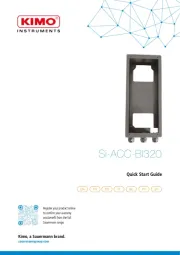
14 September 2025

14 September 2025
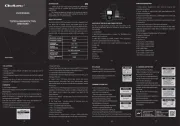
13 September 2025

13 September 2025

13 September 2025

13 September 2025
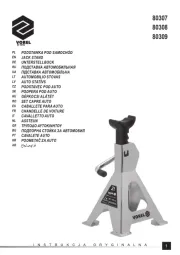
13 September 2025
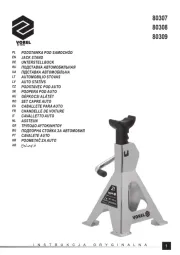
13 September 2025
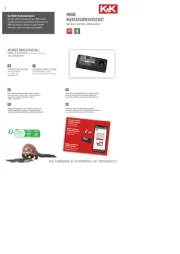
13 September 2025

13 September 2025